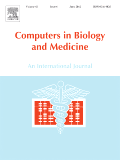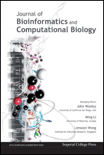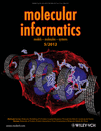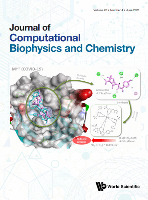
Interdisciplinary Sciences-Computational Life Sciences
metrics 2024
Advancing Life Sciences Through Computational Innovation
Introduction
Interdisciplinary Sciences-Computational Life Sciences, published by SPRINGER HEIDELBERG, is a premier journal dedicated to advancing the field of life sciences through the lens of computational methods. With an ISSN of 1913-2751 and an E-ISSN of 1867-1462, this journal serves as a significant platform for researchers and professionals alike, fostering innovation and collaboration across various disciplines. As a testament to its impact, the journal holds a Q2 category status in Biochemistry, Genetics and Molecular Biology, Computer Science Applications, and Health Informatics, reflecting its influential contributions and rigorous peer-review process. The Scopus rankings demonstrate its esteemed placement within its fields, with notable percentiles that highlight its relevance and reach. While the journal operates under a traditional access model, its commitment to publishing high-quality research continues to stimulate important discussions and developments within the scientific community. Founded in 2009 and converging through 2024, Interdisciplinary Sciences-Computational Life Sciences remains an essential resource for the latest discoveries at the intersection of computation and life sciences, appealing to both seasoned researchers and enthusiastic students eager to contribute to this dynamic field.
Metrics 2024
 0.69
0.69 3.90
3.90 2.90
2.90 33
33Metrics History
Rank 2024
Scopus
IF (Web Of Science)
JCI (Web Of Science)
Quartile History
Similar Journals

COMPUTERS IN BIOLOGY AND MEDICINE
Exploring the Frontiers of Health Informatics and Computational BiologyCOMPUTERS IN BIOLOGY AND MEDICINE is a prestigious academic journal published by Pergamon-Elsevier Science Ltd, dedicated to advancing the fields of Computer Science Applications and Health Informatics. With an impressive impact factor and ranking within the Q1 quartile for both categories, this journal plays a crucial role in disseminating high-quality research findings that influence cutting-edge developments at the intersection of computing and healthcare. Covering a broad range of topics from computational biology to medical informatics, it serves as a vital resource for researchers, professionals, and students striving to harness technology for medical advancements. The journal has been publishing since 1970 and continues to evolve, incorporating the latest trends and innovations in the field, thereby ensuring that it remains a key contributor to scientific inquiry and knowledge. With accessible content and a global reach, COMPUTERS IN BIOLOGY AND MEDICINE invites submissions that elevate the understanding and application of computational methods in biological and medical contexts.

Current Bioinformatics
Pioneering Research in Bioinformatics and BeyondCurrent Bioinformatics, an esteemed journal published by Bentham Science Publishers Ltd, serves as a pivotal platform for the dissemination of cutting-edge research in the fields of bioinformatics, biochemistry, computational mathematics, genetics, and molecular biology. With an ISSN of 1574-8936 and an E-ISSN of 2212-392X, this journal has established itself as a vital resource for researchers, professionals, and students keen on exploring interdisciplinary approaches to biological data analysis. Its prominence is reflected in its quartile rankings for 2023, where it stands in Q3 for biochemistry and computational mathematics, alongside Q4 rankings in genetics and molecular biology. Current Bioinformatics, located in the United Arab Emirates and converging from 2007 to 2024, aims to foster innovation in the field by presenting original research articles, reviews, and case studies that drive forward our understanding of complex biological systems through computational techniques. This journal is an integral resource for those wishing to stay at the forefront of bioinformatics research and applications.

Journal of Bioinformatics and Computational Biology
Advancing the Frontiers of Bioinformatics and Computational BiologyThe Journal of Bioinformatics and Computational Biology, published by WORLD SCIENTIFIC PUBL CO PTE LTD, serves as a significant platform for disseminating innovative research in the dynamic fields of bioinformatics and computational biology. With an ISSN of 0219-7200 and an E-ISSN of 1757-6334, this journal facilitates the exchange of ideas and advancements from its inception in 2003 and continues to be pivotal through 2024. Despite its classification in the lower quartiles—Q4 in Biochemistry and Q4 in Molecular Biology, along with Q3 in Computer Science Applications—the journal remains a valuable resource for researchers and students alike, as it emphasizes interdisciplinary approaches essential for tackling complex biological problems through computational methods. Located in Singapore, the journal encourages submissions of high-quality, peer-reviewed articles that offer insights into computational techniques that empower biological research. Although this journal does not offer open access options, its contributions to research are increasingly recognized across various academic platforms. As the field evolves rapidly, this journal continues to attract a growing readership, making it an essential reference point for anyone interested in the intersection of biology and computer science.

Molecular Informatics
Bridging Computational Techniques with Biological InnovationMolecular Informatics is a prestigious journal published by WILEY-V C H VERLAG GMBH, dedicated to advancing the fields of computational analysis and molecular modeling. As a key resource in the realms of Computer Science Applications, Drug Discovery, Molecular Medicine, Organic Chemistry, and Structural Biology, this journal is recognized for its significant contributions and is ranked in the Q2 and Q3 categories across multiple disciplines, positioning it among the leading journals for researchers and academics. With an impressive track record since its inception in 2010 and converging its contributions until 2024, Molecular Informatics aims to bridge the gap between computational techniques and biological applications, promoting interdisciplinary collaboration and innovation. Accessible to a global audience, the journal reflects a commitment to advancing science through open access options, making cutting-edge research available to students, professionals, and decision-makers alike. This journal serves as an indispensable platform for disseminating high-quality research and fostering the development of new theoretical and practical frameworks in molecular informatics.

COMPUTATIONAL BIOLOGY AND CHEMISTRY
Illuminating the Path of Innovation in Biochemistry through Computational InsightsCOMPUTATIONAL BIOLOGY AND CHEMISTRY is a distinguished academic journal published by Elsevier Science Ltd, focusing on the dynamic intersection of computational biology, biochemistry, and chemistry. With an ISSN of 1476-9271 and an E-ISSN of 1476-928X, this journal is committed to disseminating high-quality research that employs computational techniques to solve complex biological and chemical problems. As of 2023, the journal holds a substantial impact factor reflecting its significance and rigorous peer-review process, categorized in the Q2 quartile for both Computational Mathematics and Organic Chemistry, alongside Q3 classifications in Biochemistry and Structural Biology. With a continuous publication history spanning from 2003 to 2024, it serves as a critical resource for researchers, professionals, and students alike. The journal offers various open access options, ensuring that vital research findings are accessible to a global audience, further enhancing collaboration across disciplines. Engage with cutting-edge studies and contribute to the evolving landscape of computational methodologies in the life sciences through this esteemed publication.

NEW GENERATION COMPUTING
Shaping Tomorrow’s Computing Landscape TodayNEW GENERATION COMPUTING is a prominent academic journal published by SPRINGER, specializing in the dynamic fields of Computer Networks, Hardware and Architecture, Software Engineering, and Theoretical Computer Science. With a commitment to disseminating high-quality research since its inception in 1983 and extending its coverage to 2024, this journal occupies a vital role in advancing knowledge and innovation within these critical domains. Holding prestigious Q2 rankings in Computer Networks and Communications, Hardware and Architecture, and Software, as well as a Q3 ranking in Theoretical Computer Science for 2023, NEW GENERATION COMPUTING attracts significant contributions from scholars and professionals around the globe. Researchers will find its rigorous peer-review process ensures the publication of impactful studies, while students gain access to cutting-edge research that shapes contemporary computing practices. Though it does not offer open access, the journal remains an invaluable resource in the academic community, fostering collaboration and dialogue among experts aiming to push the boundaries of technology.

TURKISH JOURNAL OF BIOLOGY
Exploring the Depths of Life Sciences for Global ImpactTURKISH JOURNAL OF BIOLOGY, published by the Tubitak Scientific & Technological Research Council Turkey, is an esteemed peer-reviewed periodical that serves as a pivotal platform for advancing the fields of Agricultural and Biological Sciences. With a strong focus on innovative research across various biological domains, including Cell Biology, Genetics, and Microbiology, this journal not only fulfills the academic community's quest for high-quality research but also fosters collaboration and knowledge sharing among researchers. The journal's notable impact factors reflect its commitment to excellence, with its latest rankings placing it in Q2 in Agricultural and Biological Sciences (miscellaneous) and in Q4 for several other categories. By offering open access to its content, TURKISH JOURNAL OF BIOLOGY ensures that valuable biological insights are readily available to the global academic community. Its convergence from 2006 to 2024 signifies its longstanding influence in the biosciences, making it an essential resource for researchers, professionals, and students alike aiming to stay at the forefront of biological research and innovation.

Journal of Computational Biophysics and Chemistry
Advancing the Frontiers of Biophysics and ChemistryThe Journal of Computational Biophysics and Chemistry, published by World Scientific Publishing Co. Pte Ltd, is a distinguished platform dedicated to advancing the fields of biophysics and computational chemistry. With an ISSN of 2737-4165 and an E-ISSN of 2737-4173, this journal has garnered attention since its inception, earning a Q3 ranking in Computational Theory and Mathematics and Q4 rankings in both Computer Science Applications and Physical and Theoretical Chemistry as of 2023. The scope of the journal encompasses innovative research that integrates computational techniques with biochemical applications, making it essential reading for researchers, professionals, and students alike. With open access options available, the journal ensures that cutting-edge findings are easily accessible to a global audience, thereby fostering collaboration and innovation in the scientific community. Based in Singapore, the journal aims to converge ideas and methodologies from 2021 to 2024, paving the way for transformative insights in computational methods. Join a community at the forefront of research and applications that bridge disciplines through rigorous scholarship and pioneering discoveries.

All Life
Fostering Innovation in Agricultural and Biological ResearchAll Life is a distinguished academic journal published by TAYLOR & FRANCIS LTD, based in the United Kingdom, focusing on the interdisciplinary realms of agricultural and biological sciences, biochemistry, genetics, and neuroscience. With the ISSN 2689-5293 and E-ISSN 2689-5307, this open-access journal aims to disseminate high-quality research from 2020 to 2024, facilitating a wider reach and impact across various fields. Notably, it holds a Q3 ranking in both Agricultural and Biological Sciences, as well as Biochemistry, Genetics and Molecular Biology, and a Q4 ranking in Neuroscience, reflecting its growing presence in these disciplines. All Life aims to foster collaboration among researchers, professionals, and students, encouraging innovative approaches in understanding life sciences. By delivering timely insights and thought-provoking discussions, the journal plays a crucial role in advancing knowledge and promoting interdisciplinary dialogue in the evolving landscape of life sciences research.

THEORY IN BIOSCIENCES
Empowering Researchers through Open Access KnowledgeTHEORY IN BIOSCIENCES, published by SPRINGER, is a prominent academic journal in the interdisciplinary fields of Applied Mathematics, Ecology, and Statistics. With an ISSN of 1431-7613 and an E-ISSN of 1611-7530, this journal is accessible to a global audience and facilitates Open Access options, ensuring that cutting-edge research reaches its intended audience promptly. Established in 1997 and set to converge into 2024, THEORY IN BIOSCIENCES holds a pivotal role in advancing theoretical and methodological approaches in biosciences, evidenced by its respectable placement in the Q3 quartile within the 2023 category rankings. Its Scopus rankings reflect a growing reputation, particularly in Mathematics and Ecology, making it an essential resource for researchers and professionals seeking to enhance their understanding of complex biological systems and data analysis techniques. Positioned in Germany and powered by SPRINGER's esteemed publishing standards, the journal is dedicated to fostering scholarly communication, offering a platform for innovative research that bridges theoretical frameworks and practical applications.